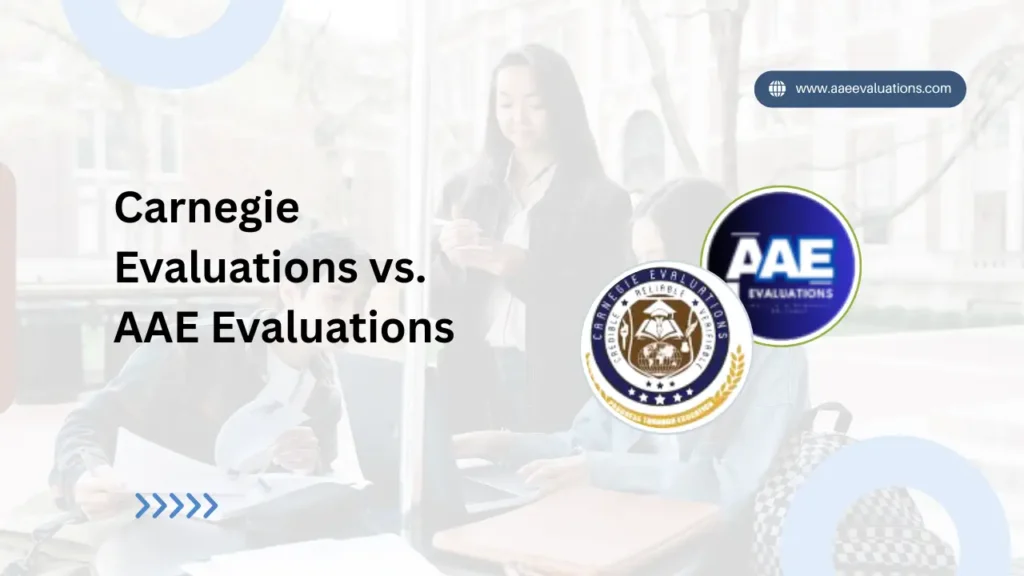Education Evaluation: Your First Step to Studying Internationally
Every year, thousands of students dream of pursuing higher education at prestigious international universities. While they prepare test scores, recommendation letters, and statements of purpose, one vital requirement is often overlooked education evaluation.
Before an international university can process your application, it must understand how your previous academic qualifications compare to its own educational standards. This is where education evaluation becomes essential. It provides clarity, authenticity, and transparency regarding your academic history, ensuring your qualifications are recognized and accepted abroad.
This detailed guide explains why education evaluation is crucial, how it works, which agencies are approved, and how to prepare your documents efficiently.
What Is Education Evaluation?
An education evaluation, also known as a credential evaluation, is the process of assessing and interpreting academic documents earned in one country to determine their equivalence in another.
For instance, if you completed a Bachelor’s degree in India and are applying for a Master’s program in the United States or Canada, an education evaluation will explain how your degree aligns with their system including course credits, grades, and academic level.
Leading agencies like AAE Evaluations and Educational Credential Evaluators (ECE) describe credential evaluation as a structured comparison that allows universities, employers, and licensing boards to make fair academic decisions about international applicants.
Why Education Evaluation Matters Before Applying Abroad
1. Ensures Global Recognition of Academic Credentials
Each country has a distinct educational framework, grading scale, and credit system. Universities abroad need to know whether your qualifications match their academic expectations. An education evaluation provides this comparison in a standardized format that is easy for institutions to interpret.
According to AAE Evaluations, credential evaluation helps universities confirm that international students possess the necessary academic preparation to succeed in their programs. This validation gives universities confidence in your academic background and helps maintain their admission standards.
2. Increases Admission Success Rate
Submitting an education evaluation report early in your application demonstrates your preparedness and seriousness as an applicant. Many universities in the U.S., U.K., Canada, and Australia now require an official evaluation report before processing applications.
Providing this report upfront reduces administrative delays and significantly increases your chances of acceptance.
3. Required for Work Visas, Immigration, and Licensing
Education evaluation is not limited to academic use. Immigration departments, professional licensing authorities, and employers frequently request it to verify your educational background.
For example:
- IQAS (International Qualifications Assessment Service) evaluations are accepted by Canadian immigration authorities.
- NARIC/ECCTIS (UK) assessments are essential for employment and professional registration in the United Kingdom.
Thus, evaluation serves as an official record that supports your visa, job, or migration process.
4. Strengthens Scholarship and Financial Aid Applications
Scholarship committees need a reliable way to compare applicants from different countries. A verified education evaluation helps them understand your GPA, course structure, and academic performance clearly.
A standardized report ensures that reviewers interpret your academic achievements accurately, giving you an edge when applying for scholarships or grants.
5. Prevents Application Delays and Rejections
Submitting incomplete or unverified transcripts can cause significant delays in your admission process. By completing your education evaluation well before applying, you minimize risks of rejection due to missing documentation or unrecognized degrees.
It also helps you identify potential issues early, such as unaccredited institutions or incomplete course records.
Step-by-Step Process for Education Evaluation
The education evaluation process typically follows several structured steps. Below is a complete overview of how to complete it correctly.
Step 1: Choose Your Evaluation Agency AAE Evaluations
Your first step should be to choose a reputable and approved agency that performs credential evaluations for international students. AAE Evaluations is one such trusted organization that provides detailed, accurate, and recognized reports for academic, professional, and immigration purposes.
AAE Evaluations is known for its precise documentation verification and timely reporting, making it a reliable choice for students applying to universities in the U.S., Canada, and other countries.
Step 2: Select an Approved Evaluation Agency
Once you’ve reviewed AAE Evaluations, you may also explore other globally recognized agencies that are approved by major international universities.
Here are some of the most respected evaluation services:
| Agency Name | Region/Use | Key Highlights |
| AAE Evaluations | U.S., Canada, Global | Detailed evaluation reports, fast processing, and accepted by multiple universities. |
| Educational Credential Evaluators (ECE) | U.S. | Provides comprehensive course-by-course and document-by-document reports. |
| IQAS (International Qualifications Assessment Service) | Canada | Used for both immigration and higher education applications. |
| NARIC/ECCTIS (UK) | United Kingdom | Recognized for degree equivalency and professional recognition. |
Step 3: Gather Your Academic Documents
Before starting your application, collect the following:
- Degree certificates and mark sheets
- Official transcripts sealed and signed by your university
- Proof of accreditation from your institution (if required)
- Certified English translations for documents in other languages
Ensure that all documents are clear, complete, and authentic. Most evaluation agencies require the transcripts to be sent directly from your university to avoid tampering or falsification.
Step 4: Submit Documents and Pay Evaluation Fees
Visit the official website of your chosen evaluation agency, create an account, and submit your documents digitally. Fees vary depending on the type of evaluation you choose and the delivery method of the report.
You may opt for either:
- Document-by-Document Evaluation: Validates your degree and institution authenticity.
- Course-by-Course Evaluation: Provides a detailed grade, GPA, and credit comparison.
- Professional Evaluation: Required for regulated professions such as engineering, medicine, or law.
Step 5: Receive and Send the Evaluation Report
After verification, the agency will prepare your evaluation report. Many services now provide secure digital reports that can be sent directly to your target universities.
Universities often require the report to come directly from the evaluator, ensuring the integrity and authenticity of your academic records.
Professional Comparison Table: Types of Education Evaluation
| Type of Evaluation | Purpose | Typical Use |
| Document-by-Document | Verifies the authenticity of academic credentials and confirms the level of degree attained. | Used for employment or immigration purposes. |
| Course-by-Course | Converts grades, credits, and GPA into the equivalent format of the destination country. | Required for university admissions. |
| Professional Evaluation | Evaluates education for licensed or regulated professions. | Necessary for medical, legal, or technical licensure. |
Accreditation and Translation Verification
An essential aspect of education evaluation is confirming the accreditation status of your institution and the accuracy of your document translations.
If your documents are issued in a non-English language, they must be translated by a certified translator. Evaluation agencies then verify that each translation corresponds accurately with the original document.
Furthermore, evaluators check whether your educational institution is officially recognized in its home country. Degrees from unaccredited or unrecognized institutions may not hold value abroad, making this verification step crucial for maintaining academic credibility.
When Should You Start the Evaluation Process?
It is advisable to start the education evaluation process at least 3 to 6 months before your university application deadlines. The processing time varies depending on the agency and the country from which your documents are issued.
Starting early gives you enough time to resolve discrepancies, submit additional documents if requested, and ensure that your report reaches universities before deadlines.
Tips for a Smooth Evaluation Experience
- Review the specific evaluation requirements of each university you are applying to.
- Send official transcripts directly from your institution to the evaluator.
- Keep multiple digital copies of your evaluation report for future applications.
- Select an evaluation type that matches your purpose, academic, professional, or immigration.
- Always verify that the evaluator is recognized by the target university or immigration authority.
Common Mistakes Students Make
- Submitting photocopies instead of sealed official transcripts
- Failing to translate non-English documents accurately
- Choosing an unapproved or unrecognized evaluation agency
- Starting the evaluation process too close to the application deadline
- Not reviewing the university’s specific reporting requirements
Avoiding these mistakes will save you time, money, and unnecessary stress during your application process.
Conclusion
In today’s competitive global education environment, an education evaluation is no longer optional; it is an essential step that validates your academic journey and ensures your qualifications are recognized worldwide.
By obtaining an evaluation from a reputable agency like AAE Evaluations, you establish trust with universities, employers, and immigration authorities. It confirms that your academic achievements meet international standards and that you are fully prepared for success abroad.
Whether your goal is to pursue advanced studies, apply for professional licensing, or qualify for immigration programs, starting your education evaluation early will give you a significant advantage. It is the foundation of a transparent, credible, and globally accepted academic profile.



